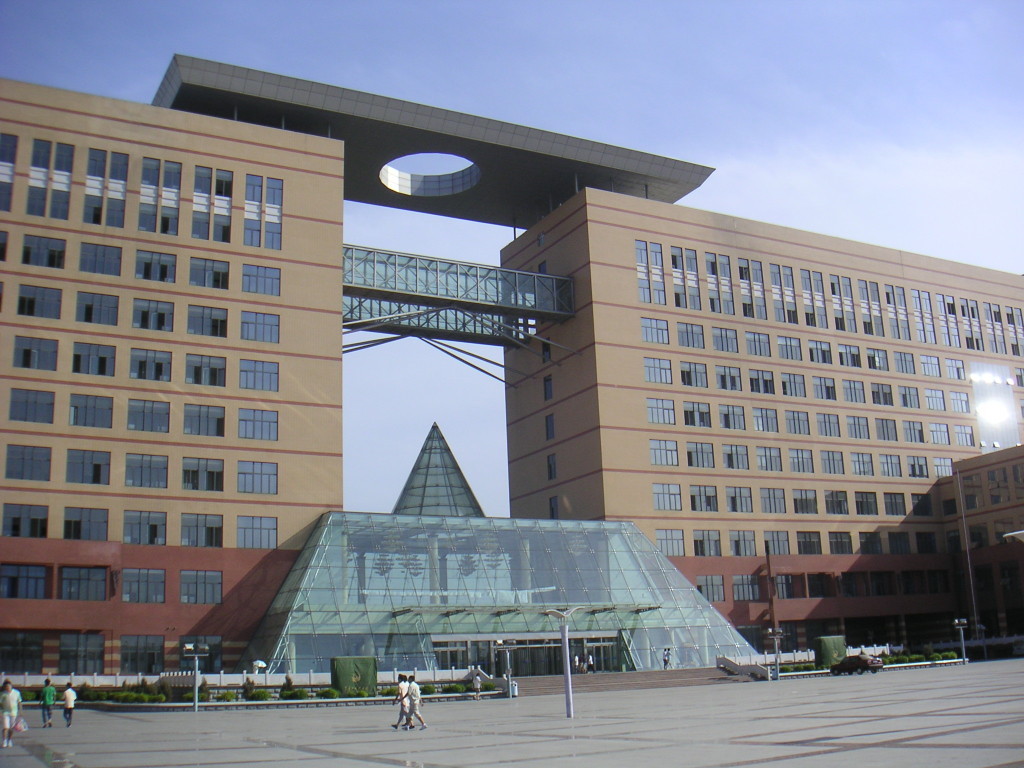By Cody Klyne & Dylan Hackett
[dropcap]A[/dropcap]re all Canadian degrees created equal? Statements brought forth by the Global TV program 16×9 question the integrity of Douglas College’s joint degree programs in China.
“Eventually, everybody will pass—by fair means or foul,” says former English teacher, Chris Harpham, interviewed by 16×9, “…many students, and some of the English teachers, are saying that this is just an easy way to make money.”
The January 28 segment, entitled “Dubious Degrees,” investigated the quality of Douglas College degrees awarded in the college’s joint degree program with the Heilongjiang Institute of Science and Technology (HIST) in Harbin, China—claiming that the academic standards and examination policies do not align with those maintained in Canada for the same Douglas degrees.
Douglas College president Scott McAlpine addressed the 16×9 claims in a message sent to students prior to the episode’s broadcast, categorizing the allegations as “simply false.” McAlpine, who was also interviewed by 16×9, confirmed that a review of the program was made in 2010 as a result of Douglas faculty concerns over HIST program English competency and grading of supplemental exams. McAlpine also noted that—since the 2010 review—the college has taken steps to resolve the program’s issues: raising admission standards, reducing business class sizes, adding ESL instruction to second-year studies, and changing exam policies. Further, last month McAlpine and the Douglas College Board ordered an external independent review of the program.
Still, the question remains, when did Douglas College enter the foreign education market in China and, moreover, what has happened to its once award-winning program to cause such a stir?
[hr]
Program history
For Douglas College, it’s an international partnership 14 years in the making that found its start in 1998 at the Shanghai Institute of Foreign Trade (SIFT). Here, a 20 course (60 credit) Associate Arts diploma, offered by Douglas College’s Business Department and taught by Douglas College faculty, was combined and fully integrated with two years of instruction at SIFT to compose the institute’s Bachelor of Commerce Program.
It’s in this incarnation that the joint program won the “Outstanding Program in International Education” award from the Canadian Bureau for International Education in 2001, and took second prize for best international program from the Shanghai Education Commission.
Six years after the SIFT program began, in 2004, Douglas College expanded to Heilongjiang Institute of Science and Technology in Harbin, China—offering a similar joint Douglas College diploma/HIST degree program.
But, by late 2007, change was in the air. According to one source, the “Shanghai government informed SIFT that it would not provide approval to renew the joint program between SIFT & Douglas College, after the existing agreement expired in 2008.” When the partnership faced termination, things took a turn: Douglas would begin offering Canadian degrees in China.
[hr]
A Canadian degree in Canada vs. a Canadian degree in China
On paper, there is virtually no difference between a BBA granted by Douglas College obtained in Canada or in China. For example, HIST student transcripts show 60 credits (20 courses) individually as though the student attended classes in Canada, taught by Canadian faculty. In the case of the student obtaining a BBA, sources say that the credits are then represented as a block transfer, again stating that it has been obtained in Canada. The similarities continue down to the final documentation given to students in China who complete their BBA, which clearly states on the front as being awarded in New Westminster, Canada.
To make this change—from providing a two-year diploma as part of a joint partnership to providing a bona fide Canadian degree in China—Douglas College had to articulate (matching the content of courses that transfer between post-secondary institutes) an additional 60 credits to meet the standards established to earn a Canadian degree. Sources state that what would normally have taken months (per course) to accomplish was then done in weeks.
The time in which the agreement was struck, to the time the first BBA was handed out in China, only stands to confirm this claim. And so, with the addition of these 60 articulated credits, the partnership between Douglas College and its Chinese partner institutes was allowed to continue.
[hr]
The difference
“There is no doubt that some students are about to receive a Douglas College credential who have not earned this credential. This cannot be allowed to occur without damaging the academic integrity of the program and diminishing the credential itself,” says a statement contained in a 2010 internal report on the Douglas College China program, brought to light by 16×9 correspondent Patrick Brown near the end of the segment, that perhaps sums up the core of the issue best.
President McAlpine rebuts this point on 16×9, stating that, “Rectifying the past is not within our periphery. Can we make progress toward the future? The answer is yes. Are we? The answer is yes.” Still, the evidence of past and current academic dishonesty remains and is no less concerning for the students of Douglas College’s Canadian campuses who are left with more questions than answers.
Speaking to the English competency level of some of the students enrolled in Douglas College’s China programs, one former International Education College (IEC) teacher at the Heilongjiang Institute of Science and Technology, Nicole Reader, recalls “I still don’t think that I was adequate enough to be teaching those students.” Limited to some extent by the established curriculum, Reader took it upon herself to push the students she encountered. Even still, she admits to feeling as though the program was not providing the professors—either fellow IEC teachers or Douglas College professors—with the necessary resources or the framework to provide the students the opportunity to learn the language at a college level.
“These kids would have had a hope and could have succeeded and thrived and not be where they are instead of just having these degrees being pumped out,” Reader said. Later recalling a time that she remembers Douglas College professors requesting Douglas College to supply proper English teachers, to come and teach the students, Reader remembers the answer being, simply put, “no.”
“I felt bad for the [Douglas College] professors and for the students [of the program]. They were left with the Chinese faculty having to choose what teachers would be adequate.” Considering the rate at the time for IECs was 5,000 Chinese Yuan Renminbi (CNY) per month—or 4,500 CNY in Reader’s case (or approximately $500 CAD in 07/08, the time of her employment)—you can imagine this monetary restriction acting as a limiting factor.
But English competency upon graduation for Douglas College’s China program students is only one example of the disparity present between the requirements enforced in Canada and China. While there are cultural differences and idiosyncrasies to be considered—not the least of which is an educational milieu drastically different from our own—the fact remains that the degrees up for grabs abroad are no different from those obtained here at home.
Consider the following hypothetical situation: Student A attends classes in New Westminster; Student B attends classes at David Lam. Student A is required to meet the minimum entrance requirements of a grade of a C in English 12; Student B is only required to display a rudimentary understanding, with no formal documentation or credential. Student A is put on a waiting list to gain admittance to a class; Student B is admitted regardless and without question. Student A is paying $15,000 CAD for four years of study (not including additional fees and textbooks); Student B is paying less than $10,000 (all inclusive). Student A fails their course and is provided with little to no options to appeal or make up; Student B is provided with as many make up exams as is required for them to pass their course. Student A passes their program with a CGPA of 2.5; Student B passes the exact same program with a CGPA of 4.05 due to academic tampering and the philosophy that “everyone graduates.”
Reader comments that, “I had to leave [China], knowing and hearing stories that my students’ grades would be changed. Students that I did fail, would pass.” Though never witnessing it herself, Reader goes on to say that “they would make the exams easier, and easier, and easier, and it would be the Chinese faculty—not the professors of Douglas College.” This, according to sources, is the situation in regards to Douglas College’s China programs.
What does this mean for Student A and Student B from our example? Student A represents every student currently enrolled at New Westminster and David Lam; Student B represents every student attending classes at SIFT and HIST as part of Douglas College’s Canadian degree China program.
With sources saying fewer and fewer Douglas College faculty are directly involved in the program in China, with purportedly up to 4/5 of the instruction being done by Chinese faculty in Chinese, who stands to benefit from the current system? It’s certainly not the China program students who earn their BBAs and are unable to understand English, and it’s most certainly not the Canadian students who are left facing an increasingly competitive post-graduation market.
[hr]
What does the prestige of a Canadian degree mean?
Being awarded a degree from Canada (in this case, a bachelor’s in Business Administration) is evidence that a student has mastered the skills that any Canadian undergraduate student would have—including full English skills. With English being the second-most spoken language in the world after Mandarin, Chinese national students are inclined to learn English as a business skill in networking and for an inroad to the international job market. A potential employer in China would likely be very impressed by a Canadian degree because it implies that the graduate has the English language fluency necessary to obtain a Canadian undergraduate degree.
[hr]
International education market
“International education is worth about $7 billion a year to the Canadian economy. For Chinese students who don’t have the money to study overseas, a foreign education inside China is an affordable option,” reports 16×9 correspondent Patrick Brown.
International education is a great way for students to become immersed in new culture, learn, travel, and network. It is actively promoted countrywide by the Canadian Consortium for International Education Marketing (CCIEM). Schools involved in the consortium send representatives across the globe to attract students to their institutions. Douglas College is tied to the CCIEM by means of membership to the Association of Canadian Community Colleges.
International education is a financially lucrative endeavour which is beneficial for both schools that host international students and schools that send students abroad—many conferences are held worldwide with the purpose of enticing students to study abroad.
Douglas College offers many field schools for its own domestic and international students to take part in. Some field schools, like the Wales Field School, also link students through to foreign universities where Douglas Associate of Arts and Science degrees are accepted to finish their undergraduate education.
[hr]
What’s at risk?
As is outlined in the conclusion of the 16×9 segment by former Dean of Commerce and Business Robert Buller, if the standard of education for students studying at HIST/SIFT is not raised to the level of regular Douglas College students, the student population and reputation of the college stands to suffer. The student population of Douglas College has a vested interest in the enforcement of Douglas educational standards when the school’s reputation and the perceived value of their education is at stake.
As we await the result of the upcoming external review, as well as further comment from administration close to the program, stay tuned for more information as it becomes available to us.


